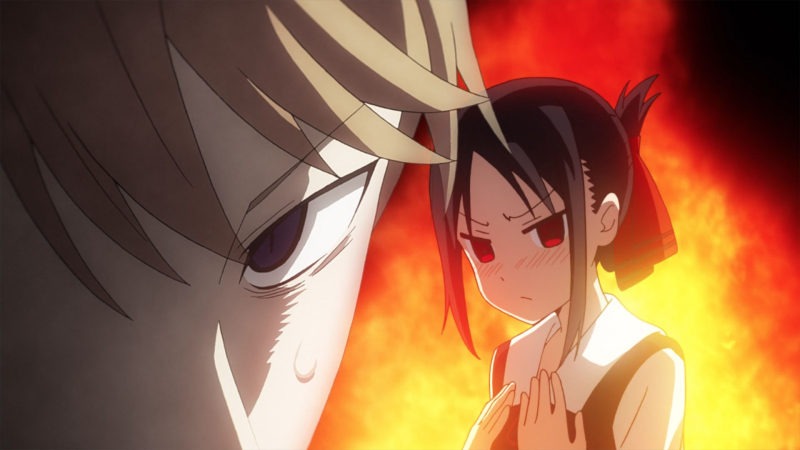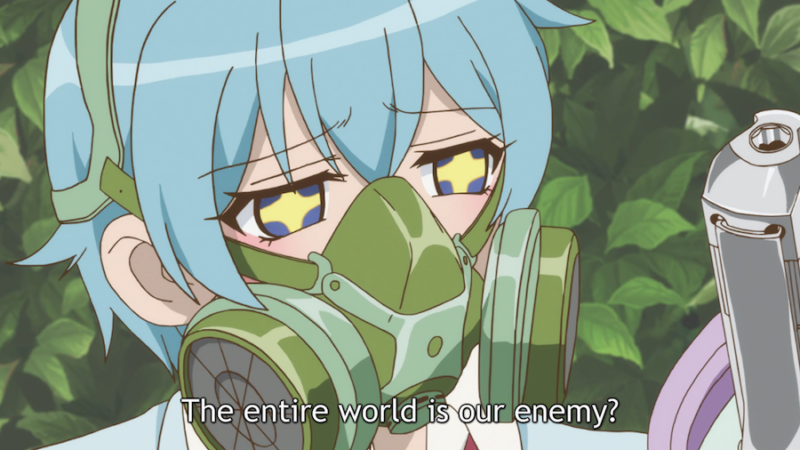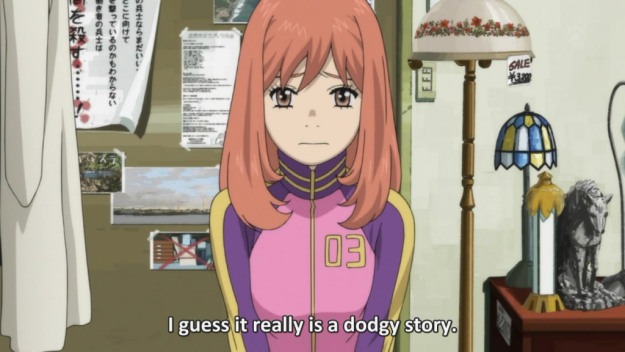 The Curse of Knowledge makes it hard for people to communicate. It doesn’t matter if you’re writing an anime blog post or an academic journal article. We know what we know, and we don’t know what the reader doesn’t know. Worse, we can’t really push our knowledge aside. In fact, this problem makes it hard for people to break into a topic or community. Think of how you were called a newb in a video game or on an anime forum just because you don’t understand the terms people throw around.
The Curse of Knowledge makes it hard for people to communicate. It doesn’t matter if you’re writing an anime blog post or an academic journal article. We know what we know, and we don’t know what the reader doesn’t know. Worse, we can’t really push our knowledge aside. In fact, this problem makes it hard for people to break into a topic or community. Think of how you were called a newb in a video game or on an anime forum just because you don’t understand the terms people throw around.
Lines between those who know and those who know not become grounds for identity. And it becomes grounds for bad writing.
Stephen Pinker uses the phrase The Curse of Knowledge in his book The Sense of Style. He explains how the curse comes from how our minds work. I’m sure you’ve read papers and blog posts that teemed with abstractions. Words like tsundere, harem, otaku, baka. And with acronyms like yaoi, lmao, tl;dr. They might make sense to you, but for some, like those new to anime, these words prove difficult. These words stand in for experiences and memory chunks, as Pinker puts it, that make up the idea. Let’s look at tsundere as an example.
When you read tsundere you likely envision one of your favorite characters: Asuka Langley Soryu, Mikoto Misaka, Germany (not the nation–see how the Curse of Knowledge works?). Your memory of the character includes their actions, the anime’s story, your thoughts toward the character, and your feelings toward the character. These chunks of memory won’t be the same as mine. The difference between your chunks and mine may cause confusion. It’s worse for those just getting into anime. They have all of these abstractions thrown at them without any frame of reference.
How Memory Works

The Curse of Knowledge assumes you know what I know. That includes knowing my particular set of memory chunks and all without me explaining it. Pinker cites our limited memory capabilities for the reason why chunking and abstraction exist. Let’s think of our memory as a 6-slotted egg carton. My previous list of tsundere characters can take 4 of those slots: one for the concept of tsundere, one for Asuka, one for Mikoto, and one for Germany. Now if you don’t know what I mean by Germany (a character from Hetalia) the fifth slot can be taken by that extra bit of information. Of course, if you aren’t familiar with any of those characters, the abstraction of their names will end up taking up much more memory. You’ll need another 6-slotted egg carton for Asuka’s characteristics: from Neon Genesis Evangelion, her personality, visual memory of her, audio memory of her voice actress, and other information.
However, if you are well-versed with all these names, you will need a single egg-slot: tsundere. This is because the word, the abstraction if you will, summarizes all of these characters and traits. It probably summarizes even more if you are a tsundere lover. In general, you need to use more memory for concepts you aren’t familiar with than concepts you know well. That familiarity becomes a problem when you are trying to explain something.
I’ll use my knowledge of Pinker’s book as another example. I’m working from the assumption that you haven’t read it. But I could’ve assumed you would understand what I mean by the phrase memory chunks and left you without my egg-carton explanation. I’ve noticed many anime discussions, including my own, assume knowledge from the reader. Of course, when I’m writing for an anime fan like you, I can assume a great deal. But at the same time, you might also be new to anime, otaku culture, and Japanese culture studies. In that case, I fall into the Curse of Knowledge.
Functional Fixity

As we learn more about a topic, we think more abstractly about it. This leads into another cognitive problem: functional fixity. Function fixity is our tendency to understand something only as we usually understand it. I’ll use the example Stephen Pinker uses: in a research experiment, people are given a candle, a box of matches, and a box of thumbtacks. They are asked to attach the candle to the wall so the wax won’t drip onto the floor.
How would you solve it? I’ll wait for your answer.
Did you come up with anything?
Most people in the study didn’t figure out the solution either: dump out the thumbtacks, put the candle in the thumbtacks box, and tack the box to the wall. Functional fixity is the focus on an object’s function and forgetting its physical makeup. Functional fixity mixes with chunking and the Curse of Knowledge to blind us. All of this combines into nebulous terminology (to anyone not the writer) and convoluted logic. Keeping the reader in mind helps, but it only slightly curbs the Curse of Knowledge. As, I’m sure, you notice in this article.
So Why Does the Curse of Knowledge Matter?

So why does all of this cognitive stuff matter? Well, I’m assuming you like to discuss anime with friends or to blog about anime. Keeping these ideas in mind will help you communicate clearer. I worry about identity. I’ve seen a lot of poisonous behavior in the anime community. While there are more good, helpful fans than asps, we still need to understand why snakes are snakes. We need to continually tell these fans that their behavior is unacceptable, whether its sparking waifu wars, trolling new fans, or acting elitist. However, we also need to understand that the cognitive biases that lead them to such behavior resides in us too. I fall into the Curse of Knowledge daily. It doesn’t matter if I’m writing or speaking with someone, I fall into the curse. I also have a bad habit of bulldozing people. That is, I yammer on about a topic (usually when the topic is Christianity) without regard to the other person. I’m passionate about the scholarly study of Christianity and rarely find an outlet for it. When someone gives me an opening, I tend to drown them.
But then, I’ve had anime fans do that to me too.
How to Improve our Thinking

Luckily, thoughts are skills that can be learned and improved upon. In fact, depression and other emotional states can be thought of as skills that require practice to hone. Mental practices can physically reshape our brains over time as neurons grow new connections and prune their old, unused ones. It takes time. A lot of time. For example, I used to have depression. It could be severe at times. After I discovered Zen, I began to practice it a little at a time. I like to do walking meditation, and I stop and breath throughout the day for short intervals. After about ten years of practice, I do not experience depression anymore. It’s been several years since I had a depressive episode. Now, even when a family member dies (as had happened as I write this article), I can say I don’t get depressed. I mourn, but that is separate from depression. But it took me ten years of daily practice to get to this point, and I still practice.
Improving your thinking is hard work, and the time it takes can discourage you. But improving the mind requires only one thing: mindfulness. We have to be aware of our faulty thinking, whether it’s the Curse of Knowledge or depression, and challenge those thoughts. That involves asking yourself questions like these:
- Is this thought coming from depression? Is it truly a reasonable thought? Why or why not?
- Is this thought assuming too much from the reader? Is it truly a clear thought? Why or why not?
The questions may be different, but the practice is the same: becoming aware of the thought and challenging it with reason. Granted, this isn’t easy, especially with emotions like depression or the passions of being a hardcore anime fan. But emotions are fully in control of your reason, whether it seems so or not; emotions fall into functional fixity. For example, when I used to feel depressed, I channeled the feelings into art and writing or meditation. I burned my depression as fuel, so to speak. Likewise, you can use your passion for anime as fuel for clear, engaging writing. But in both cases, you have to use reason to check and balance those emotions. Again, it’s not easy, and it takes years of practice.
I had decided to spend the rest of my life learning how my emotions and mind work and cultivating them in the direction I want: ending depression, avoiding the Curse of knowledge, and reducing other cognitive fallacies. I have to live with them anyway, so I might as well work to shape them instead of having them shape me. I hope that you will also come to the same conclusion and be mindful of the Curse of Knowledge with your own writing and conversations.
References
Pinker, Stephen (2015) The Sense of Style: The Thinking Person’s Guide to Writing. Penguin Books.





![The [American] Politicization of Anime dealing iwth the mikadono sisters--yuu](https://www.japanpowered.com/media/images/dealing-iwth-the-mikadono-sisters-yuu-350x230.jpg)